Introduction
In a world where adopting pets often feels like a game of chance, the Bernese Mountain Dog (or ‘Berner’, as aficionados affectionately call them) is a winning bet! With their majestic tri-color coats and gentle dispositions, these gentle giants have a knack for melting hearts, one wagging tail at a time. But there’s more to these lovable pups than meets the eye.
Originating from the beautiful Swiss Alps, Bernese Mountain Dogs were bred to be versatile farm workers. They were the go-to dogs for herding cattle, pulling carts, and keeping the family warm at night. Talk about multitasking! Their history is as rich as their fluffy coats, and they’ve earned their place as beloved family companions.
But don’t be fooled by their sweet faces and floppy ears; these dogs come with a few quirks. For example, they might decide that your lap is the perfect spot for a snooze, and good luck convincing them otherwise! Their affectionate nature makes them excellent family pets, especially for those with kids. They have an undeniable charm that can turn even the grumpiest of adults into mush.
If you’re thinking about adding a Bernese Mountain Dog to your home, it’s important to understand their needs. Yes, they’re adorable, but they also require regular exercise, grooming, and socialization. So, while they might look like fluffy teddy bears, they can’t be treated like plush toys. Speaking of plush toys, check out this adorable Bernese Mountain Dog Plush Toy—perfect for cuddling when your real Berner decides to nap on your lap!
In this guide, we’re here to cover everything you need to know about Bernese Mountain Dogs—from their history and physical traits to health considerations and training tips. Whether you’re contemplating adding one to your family or just want to learn more about them, grab a comfy seat and join us on this journey into the world of Bernese Mountain Dogs! You might just find yourself smitten with these furry friends.
So, buckle up! We’re about to plunge into the deep end of Bernese knowledge—no life jackets required!
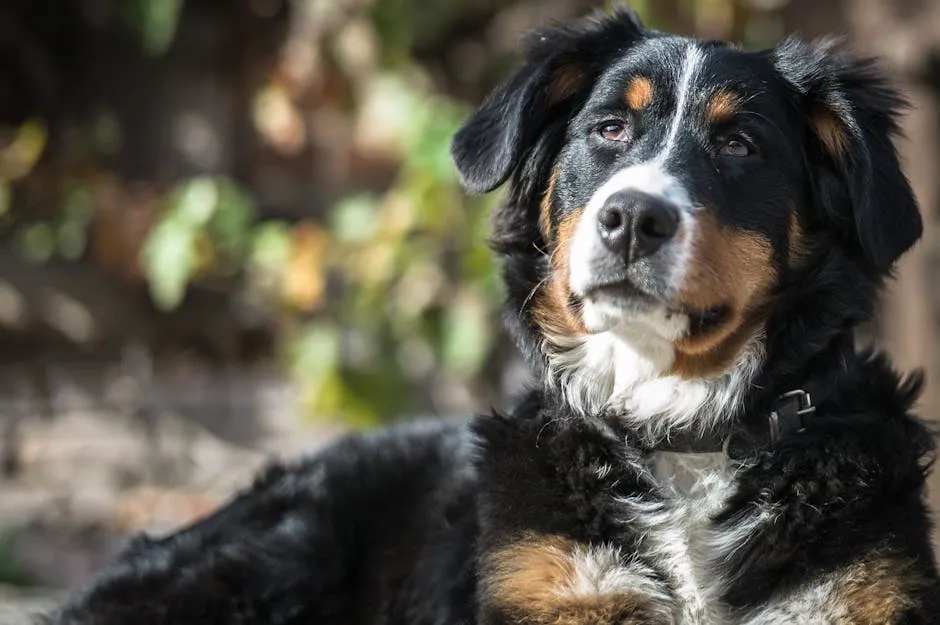
History of the Bernese Mountain Dog
Origins
The Bernese Mountain Dog, affectionately known as the Berner, has its roots nestled in the picturesque Bern region of Switzerland. These dogs were bred to be the Swiss farmers’ best friends. Imagine a landscape filled with rolling hills, lush green pastures, and the occasional cow meandering about. That’s where Berners thrived! Their primary roles included herding livestock, guarding properties, and pulling carts loaded with goods. They were the original multitaskers, always ready to lend a paw.
Farmers relied on Berners not just for their strength but also for their gentle demeanor. These dogs became an integral part of daily life, working side by side with humans. They were known for their intelligence, loyalty, and, let’s be honest, their adorable faces. Who wouldn’t want a furry companion by their side, especially one that could help carry the groceries? Speaking of carrying, you might want to consider a Dog Hiking Backpack for those outdoor adventures with your Berner!
Development
Over the years, Bernese Mountain Dogs evolved into the lovable companions we know today. Breeders focused on enhancing their abilities to work efficiently on farms, leading to their impressive size and strength. However, a few historical bumps in the road did occur. The breed faced a decline in popularity during the early 20th century, primarily due to changes in farming methods. As machines began to take over, the Berners’ role diminished.
Nevertheless, their charm and skills captured the hearts of many dog lovers. By the mid-1900s, efforts were made to revive the breed, and it worked! The Bernese Mountain Dog regained its status as a beloved family pet. Today, they’re not just farm dogs; they’re cherished members of households across the globe. Their historical journey reflects not only their adaptability but also the enduring bond between humans and dogs.
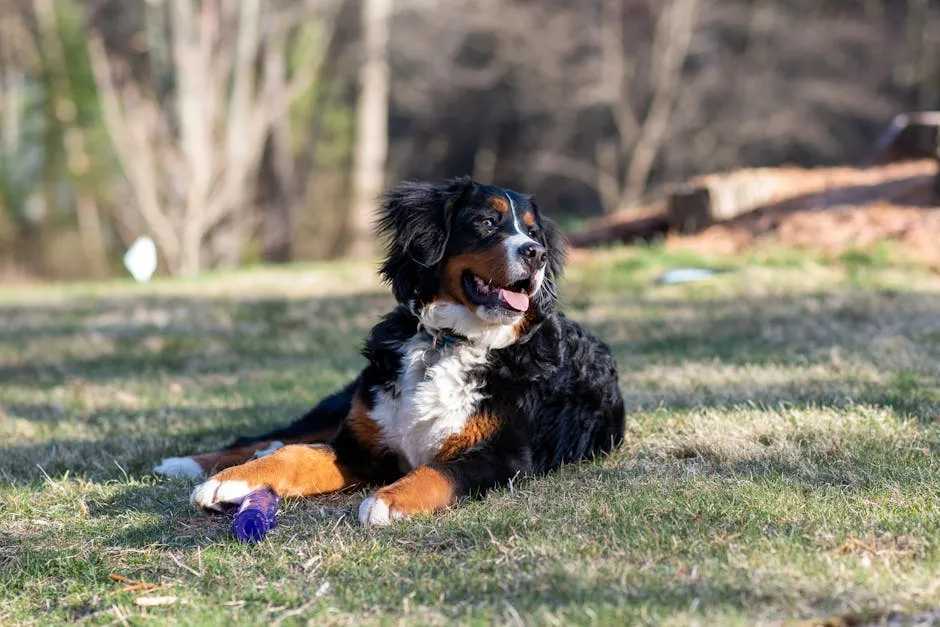
Physical Characteristics
Size and Weight
When it comes to size, Bernese Mountain Dogs are undeniably large. Males typically stand between 25 to 27.5 inches tall, while females range from 23 to 26 inches. In the weight department, you can expect males to weigh between 80 to 115 pounds and females slightly less, around 70 to 95 pounds. But don’t be fooled; genetics and breeding practices can cause some variation. You might meet a particularly hefty Berner or a dainty one. Just remember, they all come with a side of cuddles!
Coat and Color
One of the most striking features of the Bernese Mountain Dog is their tri-color coat. Picture this: a rich black base adorned with stunning rust and white markings. It’s like walking around with a living piece of art! Their double coat is thick and fluffy, perfect for those chilly Swiss winters. However, this luxurious coat comes with grooming responsibilities. Regular brushing is essential to prevent matting and keep their fur looking fabulous. To help with this, a good Dog Grooming Brush can work wonders!
Oh, and let’s not forget about shedding! These dogs tend to shed quite a bit, especially during seasonal changes. Be prepared for the occasional fur tumbleweed rolling across your living room floor. But hey, who needs a lint roller when you can have a Berner’s love?
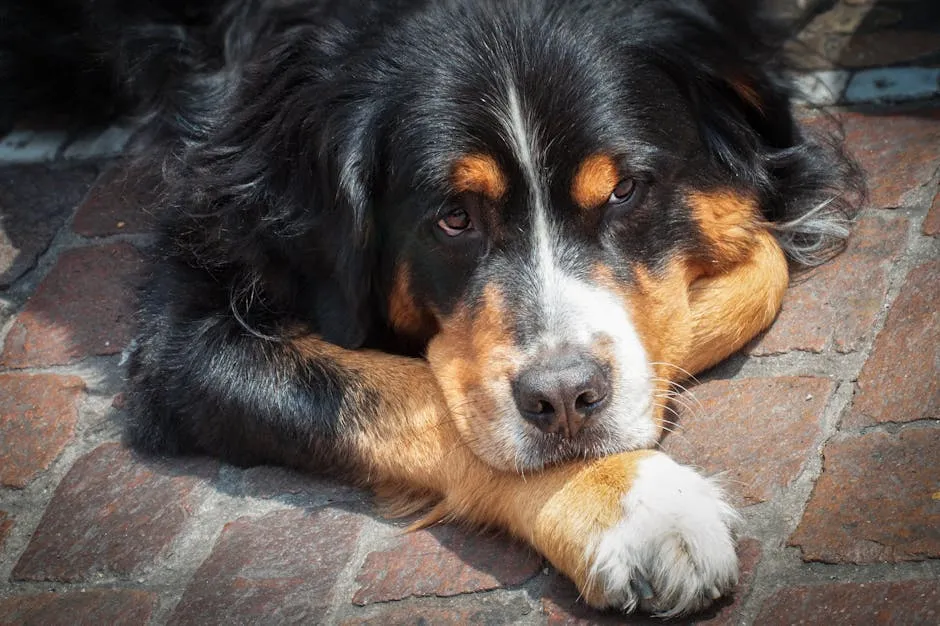
Temperament and Personality
General Disposition
If you’re looking for a friendly and gentle giant, look no further than the Bernese Mountain Dog. Known for their affectionate nature, these pups are often described as “gentle giants.” They thrive on companionship and love being part of family activities. Their patience and friendly demeanor make them fantastic with children and other pets.
Berners have a natural instinct to protect, making them great watchdogs. However, they won’t bark at every passing squirrel. Instead, they prefer to greet new friends with a wagging tail and an eager smile. That said, they do have a playful side! So, be ready for some fun antics that will leave you chuckling.
These dogs are social creatures. They enjoy being around people and can get a bit clingy. If you’re looking for a dog that thinks you’re the center of their universe, you’ve found your match! Just remember, they don’t do well with long periods of solitude. They thrive on love, attention, and, of course, belly rubs. If you’re worried about keeping their energy up, consider a Dog Puzzle Toy to keep their minds sharp!
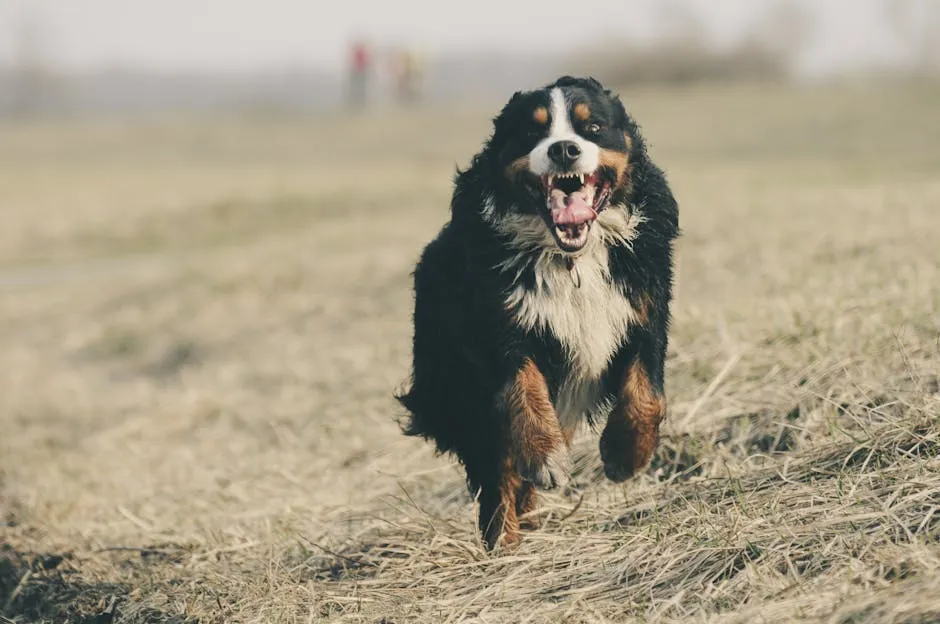
Training and Socialization
Training Techniques
When it comes to training your Bernese Mountain Dog, kindness is key! Positive reinforcement works wonders with these lovable giants. They respond best to treats, praise, and all the belly rubs you can muster. Think of it as a win-win; you get to spoil them while teaching them good manners!
Start training early. These pups are like sponges, soaking up everything you teach them. Consistency is crucial. Use the same commands and techniques every time. For example, if “sit” means “plop down,” make sure it always means that! Berners might be stubborn, so repetition is your best friend. Patience is essential, too—after all, they can be as stubborn as a toddler refusing to eat broccoli.
Training sessions should be short and fun. Aim for about five to ten minutes. This keeps their attention and enthusiasm high. Mix in some playtime to keep their spirits up. Remember, a tired Berner is a happy Berner! Also, don’t forget to have some Dog Training Treats on hand as rewards!

Socialization
Socialization is vital for Bernese Mountain Dogs. Early exposure to different dogs, people, and environments helps them grow into well-rounded companions. Think of it as a doggy meet-and-greet—introducing them to various sights, sounds, and smells.
Take your Berner to parks, doggy daycare, or puppy classes. These experiences can help them learn how to interact with others and quell any shyness. Remember, Berners thrive on companionship, so the more, the merrier!
Activities like playdates with other dogs or attending pet-friendly events can do wonders for their social skills. Even simple things like walking in busy areas can help them adapt to new situations. The goal is to create positive experiences, so reward them for good behavior during these outings. A treat here and a pat there will reinforce their confidence.
With the right training and ample socialization, your Bernese Mountain Dog will not only become a well-behaved member of your family but also a social butterfly among their furry friends!
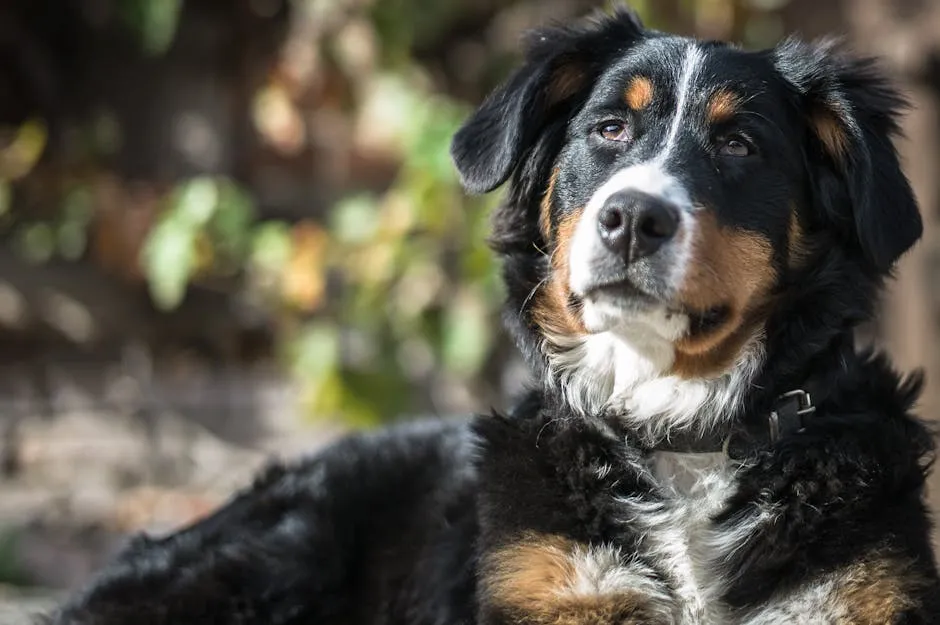
Health Considerations
Common Health Issues
Bernese Mountain Dogs, while charming, come with their share of health concerns. Hip dysplasia is a significant issue, affecting many in the breed. This condition can lead to arthritis and discomfort, making regular vet check-ups important. Statistics show that around 15-20% of Berners may face this condition. To learn more about managing hip dysplasia, check out this article on Understanding and managing canine hip dysplasia.
Understanding hip dysplasia can help you provide better care for your Bernese Mountain Dog. Understanding and managing canine hip dysplasia
Another common ailment is bloat, also known as gastric torsion. This condition is serious and requires immediate attention. It occurs when the stomach fills with gas and twists. It’s essential to be aware of the signs, which include restlessness, drooling, and a swollen abdomen.
Routine veterinary visits can help catch these issues early. Regular health screenings and x-rays can provide insights into your dog’s well-being. Additionally, having a Pet First Aid Kit at home can be a lifesaver in emergencies!

Lifespan
The average lifespan for a Bernese Mountain Dog ranges from 7 to 10 years. Several factors can influence their longevity. Genetics play a role, as does diet and exercise. Keeping your Berner at a healthy weight can prevent many health complications.
Regular vet check-ups are crucial for monitoring their health. These visits can help catch potential issues before they become serious. Vaccinations, dental care, and parasite prevention are all part of keeping your Berner happy and healthy.
In summary, while Bernese Mountain Dogs may have a few health hurdles, a proactive approach can lead to a long, happy life filled with love and companionship!

Care and Maintenance
Grooming
Bernese Mountain Dogs boast a luxurious tri-color coat that requires regular grooming to keep it looking its best. Aim to brush your Berner at least two to three times a week. During shedding season, which typically occurs in spring and fall, you might want to ramp up grooming to every day. This helps manage the fluff that tends to take over your home! For tips on grooming, check out our article on recommended grooming schedules for double coated dogs throughout the year.
Regular grooming is essential for keeping your Bernese Mountain Dog’s coat in top condition. recommended grooming schedules for double coated dogs throughout the year
When brushing, use a slicker brush or a de-shedding tool to remove loose hair and prevent matting. Pay special attention to the areas behind their ears and under their legs, where tangles can form. Remember, a well-groomed dog is a happy dog!
Don’t forget about dental care! Regular tooth brushing is crucial for keeping your dog’s pearly whites healthy. Aim for at least two to three times a week, but daily brushing is ideal. Use toothpaste formulated for dogs—no human toothpaste, please!
Nail trimming is another essential aspect of grooming. Check your Berner’s nails every couple of weeks. If you hear a clickety-clack sound on your floor, it’s time for a trim. Keeping their nails short will help prevent painful breaks and ensure comfortable walks. And for those walks, consider a durable Dog Leash!

Exercise Requirements
Bernese Mountain Dogs are not just fluff balls; they are also energetic giants! These dogs need a daily dose of exercise to stay happy and healthy. Aim for at least one hour of physical activity each day. This can include walks, hikes, or playtime in a securely fenced yard.
They absolutely love being outdoors, so consider taking them on long walks or runs. If you’re feeling adventurous, try hiking in your local mountains. Berners are built for it! And to keep them hydrated during these activities, a Dog Water Bottle is a must-have!
In addition to regular walks, consider engaging them in activities like agility training or obedience classes. These activities provide both mental and physical stimulation. Plus, they can help strengthen the bond between you and your furry friend.
If your Berner has a playful spirit, fetch is a fun way to keep them active. Just be mindful of their joints, especially when they’re young. You wouldn’t want them to overexert themselves!

Nutrition
Feeding your Bernese Mountain Dog a balanced diet is crucial for their overall health. Look for high-quality dog food that lists meat as the first ingredient. Berners thrive on a protein-rich diet, so ensure their food is formulated for large breeds. For more on canine nutrition, check out our article on Understanding canine nutrition: raw vs. kibble debate.
Ensuring your Bernese Mountain Dog has a proper diet is vital for their health. Understanding canine nutrition: raw vs. kibble debate
Be cautious about portion sizes, as this breed is prone to obesity. Measure their food and avoid overindulging in treats. Speaking of treats, opt for healthy options like carrots or green beans. They’ll appreciate the crunchy goodness! And to keep those treats organized, a Dog Treat Jar is a fun addition to your kitchen!
Berners can also face specific nutritional concerns such as bloat and hip dysplasia. To help reduce the risk of bloat, consider feeding them smaller, more frequent meals rather than one large meal. This can aid digestion and prevent gas buildup.
Lastly, always provide fresh water. Hydration is vital, especially after playtime or exercise. Keeping your Berner well-fed and hydrated lays the foundation for a long, happy life.
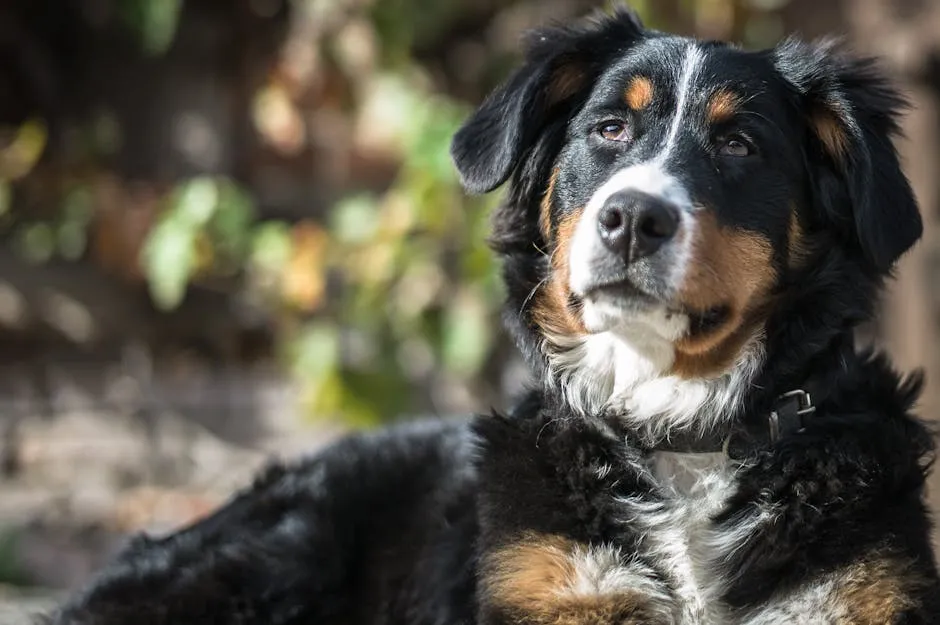
Adoption and Breeding
Finding a Breeder
If you’ve decided to add a Bernese Mountain Dog to your family, finding a reputable breeder is key. Look for breeders who are knowledgeable about the breed and prioritize health testing. A good breeder will provide health clearances for both the puppy’s parents, including tests for hip dysplasia, elbow dysplasia, and other common health issues.
When evaluating potential breeders, take note of a few red flags. If a breeder is unwilling to show you the puppy’s parents or doesn’t provide health records, that’s a cause for concern. Also, be wary of breeders who have multiple litters available at once. Quality over quantity should be your mantra!
Ask about the socialization practices the puppies undergo. A responsible breeder will expose the pups to various environments, sounds, and people before they go to their new homes. This sets the stage for a well-adjusted adult dog.
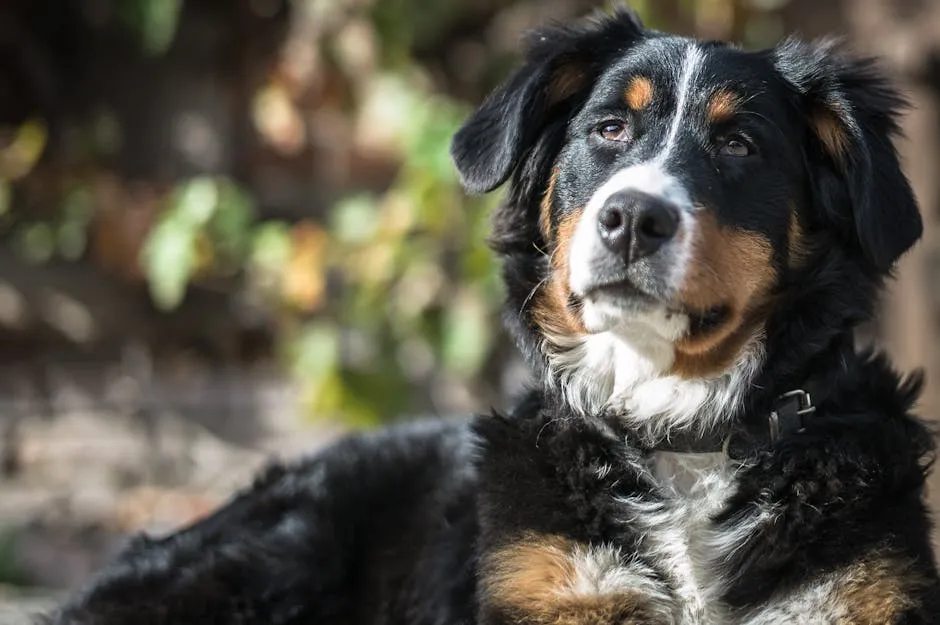
Rescue Organizations
Adoption is a fantastic way to bring a Bernese Mountain Dog into your life! Many wonderful dogs are waiting for homes in shelters and rescue organizations. By choosing adoption, you’re giving a second chance to a deserving pup while also making room for another dog in need.
Several breed-specific rescues focus solely on Bernese Mountain Dogs. Organizations like the Bernese Mountain Dog Club of America (BMDCA) have resources to help you find a dog that fits your lifestyle. They often provide information about available dogs and can connect you with local rescues.
Adopting from a shelter not only saves a life but also allows you to enjoy the joys of dog ownership without going through the puppy stage. Many adult dogs are already house-trained and have established personalities. To help your new pup settle in, consider getting a Dog Crate for their new space!
If you’re ready to adopt, check your local shelters and rescue organizations. They’re often filled with loving Bernese Mountain Dogs waiting for a family. Whether you choose to adopt or go through a breeder, your future Berner will undoubtedly fill your life with love and laughter!

Conclusion
In conclusion, the Bernese Mountain Dog is more than just a pretty face; they are a loyal companion, an intelligent worker, and a cherished family member. Their gentle giants’ nature makes them perfect for families, as they thrive on companionship and love. If you’re considering welcoming one into your home, know that you’re about to invite a furry friend with a heart full of love and a personality to match!
Understanding this breed will enrich your life. Berners are not just adorable fluffballs; they come with unique quirks and charms. They might claim your lap as their throne, and good luck trying to convince them otherwise! Their playful antics can brighten any dull day, turning even the grumpiest of moods into fits of laughter.
However, it’s essential to be aware of their needs. Bernese Mountain Dogs require regular exercise to keep their bodies fit and minds sharp. They’re not the type to lounge around all day, even though they may look like professional couch potatoes. Daily walks, playtime, and mental stimulation are vital to their overall health and happiness.
Grooming is another crucial aspect of their care. Their beautiful tri-colored coat requires attention to prevent matting and excessive shedding. But don’t worry; grooming can turn into a bonding experience! Picture yourself brushing your Berner while they snuggle up beside you, both of you enjoying each other’s company.
Of course, like any breed, Berners come with specific challenges. Health issues such as hip dysplasia and bloat are common, requiring regular veterinary check-ups. Awareness and proactive care can lead to a long, healthy life for your furry friend. To help manage those health concerns, consider investing in a Dog Health Care Book for more insights!
So, go ahead and consider adding a Bernese Mountain Dog to your life—it just might be the best decision you ever make! With their loyal hearts and playful spirits, they will undoubtedly fill your home with joy and love. Plus, who doesn’t want a giant fluffball that doubles as a cuddle buddy? It’s hard to resist their charming smiles and wagging tails!
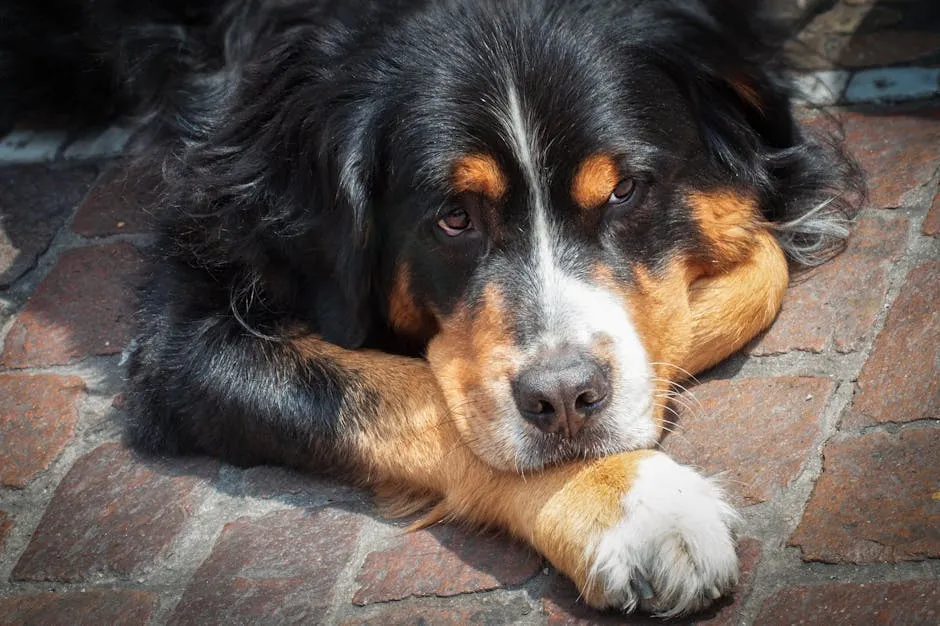
FAQs
What is the average lifespan of a Bernese Mountain Dog?
The average lifespan of a Bernese Mountain Dog ranges from 7 to 10 years. Factors influencing longevity include genetics, diet, and overall health care. Regular veterinary visits can catch potential health issues early, which is essential for extending your Berner’s life.
Are Bernese Mountain Dogs good with children?
Absolutely! Berners are known for their friendly and gentle nature, making them great companions for kids. Their patience and affection create a safe environment for little ones to interact. Just ensure that both the dog and children are supervised during playtime to foster positive interactions.
How much exercise do Bernese Mountain Dogs need?
Bernese Mountain Dogs require at least an hour of exercise daily. This can include walks, playtime in the yard, or engaging in dog sports. Keeping them active is crucial for their physical health and mental well-being. If they don’t get enough exercise, they might resort to mischief!
What are common health issues in Bernese Mountain Dogs?
Common health issues include hip dysplasia, bloat, and certain cancers. Regular veterinary check-ups, a balanced diet, and maintaining a healthy weight can help manage these risks. Awareness of symptoms is vital for early detection and treatment.
Are there any specific dietary needs for Bernese Mountain Dogs?
Yes, Bernese Mountain Dogs thrive on a high-quality, protein-rich diet. Look for dog food formulated for large breeds and avoid overfeeding. Smaller, frequent meals can help reduce the risk of bloat. Always provide fresh water to keep them hydrated and happy!
Please let us know what you think about our content by leaving a comment down below!
Thank you for reading till here 🙂
All images from Pexels





